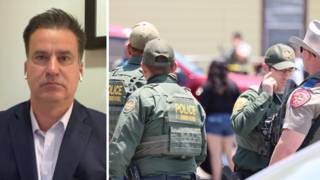
Guests
- Murtaza Hussainreporter at The Intercept focusing on national security, foreign policy and human rights.
One of the 10 victims in the Santa Fe High School shooting was Sabika Sheikh, an exchange student from Pakistan. She was due to return to her home country in June after participating in an exchange program sponsored by the State Department. CNN reporter Saeed Ahmed compared the shooting of Sheikh to that of Malala Yousafzai, who was shot in the head by a Taliban gunman who boarded her school bus in 2012. Ahmed wrote, “Both are Pakistani girls: One, Malala, was shot on her way to school by a militant in Swat, near Pakistan’s border with Afghanistan. She survived. The other, Sabika, was shot by a fellow student inside a school in Santa Fe, Texas. She died. But, as many ruefully pointed out, that’s where the comparison ends.” He went on to quote blogger Asfandyar Bhittani, who tweeted that, unlike Malala, “Sabika Sheikh will be forgotten before next weekend.” We’re joined by Murtaza Hussain, a reporter at The Intercept focusing on national security, foreign policy and human rights.
Transcript
AMY GOODMAN: This is Democracy Now!, democracynow.org, The War and Peace Report. I’m Amy Goodman. One of the 10 victims in the Santa Fe High School shooting was an exchange student from Pakistan. Her name was Sabika Aziz Sheikh. She was due to return to Pakistan just in a few weeks, after participating in the exchange program sponsored by the State Department.
Her uncle, Ansar Sheikh, called the shooting an act of terrorism and pleaded with the U.S. government to take action. He said, quote, “I don’t blame the murder of my girl on American society but on that terrorism mindset that is there in all societies. We need to fight it all over the world. I do ask the American government to make sure weapons will not be easily available in your country to anybody. Please make sure this doesn’t happen again. It really hurts,” he said.
Sabika Sheikh’s friend and fellow student Jaelyn Cogburn spoke at her funeral Sunday.
JAELYN COGBURN: When I first started school, I didn’t know anybody. I wasn’t—I didn’t [inaudible]. And it was very hard, and—because I didn’t know anyone. And I met Sabika, and she didn’t know anyone, either. And we both became very close. And she was the most beautiful, loving person I’ve ever met.
AMY GOODMAN: That was the dear friend of Sabika Sheikh in Texas at Santa Fe High School, Jaelyn Cogburn, who was her—part of her host family, speaking at her funeral on Sunday.
And now I want to read a piece by Said Ahmed on the CNN website. He wrote, “The comparisons with Malala Yousafzai began as soon as Sabika Sheikh was identified as one of the victims of the Santa Fe High School massacre.
“Both are Pakistani girls:
“One, Malala, was shot on her way to school by a militant in Swat, near Pakistan’s border with Afghanistan.
“She survived.
“The other, Sabika, was shot by a fellow student inside a school in Santa Fe, Texas.
“She died.
“But, as many ruefully pointed out, that’s where the comparison ends.
“Will Sabika be the next Malala, asked Asfandyar Bhittani, who writes for the Frontier Pakistani blog.
“'Nope,' he said. 'We all know Sabika Sheikh will be forgotten before next weekend,' [unquote].
“After Malala was shot, her cause was taken up globally. She became the face of the barbarism of the Taliban, which didn’t hesitate to shoot a child in the head to stop girls from attending school.
“Today, Malala, 20, is an activist for women’s education and the youngest Nobel Peace Prize winner. …
“At the root of the frustration is the notion that Sabika’s death will do nothing to effect change in America’s scourge of gun violence. The Santa Fe attack was the 22nd school shooting this year that resulted in casualties—an average of one a week.”
That’s just a quote from the CNN website of the piece.
For more, I want to bring into this conversation Murtaza Hussain, reporter at The Intercept focusing on national security, foreign policy and human rights.
The funeral for Sabika Sheikh was the first in Santa Fe, Texas, yesterday, Murtaza.
MURTAZA HUSSAIN: That’s right. It was a particularly tragic case, because Sabika had come as an exchange student. And these exchange programs are often ways of building goodwill between different countries. Her death, coming from Karachi, was extremely tragic, and seeing the scenes from her funeral really hit home what a loss this was for her family and for relations between the U.S. and Pakistan.
AMY GOODMAN: So talk about what we call terror and what we call lone-wolf killings.
MURTAZA HUSSAIN: Right. I think that just as Malala’s shooting, in many ways, was a cause for reflection in Pakistan and globally on the roots of violence in her society, we should be thinking about Sabika’s case as not being an aberration, but being part of the very tragically normal cycle of violence we’ve seen in the United States targeting schoolchildren and mass violence using weaponry generally. It’s not—maybe there’s not a name for it yet, but we need to have a name, we need to have a label, and we need to categorize and attack this problem and name and target the political roots of this violence, which all signs point to being the access to weaponry by ordinary people.












Media Options